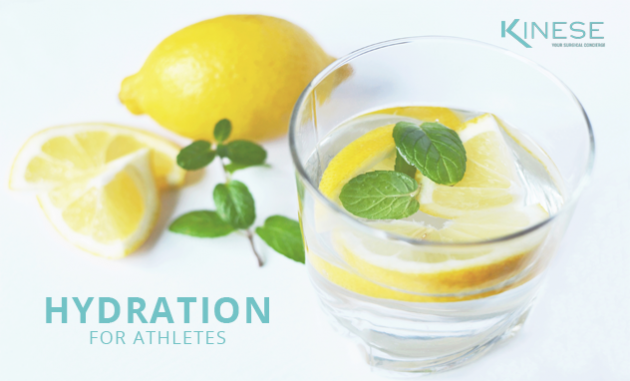Hydration

Part Six: Hydration
In relation to our latest edition on injury prevention for athletes, we depicted how nutrition is a vital component to a comprehensive injury prevention strategy. Similarly, athletes should acknowledge and understand how their hydration habits will impact their performance and prevent fatigue-related injuries. The average adult human body is composed of anywhere between 60% and 65% water. As such, without proper hydration the body will not function as it should. Lack of proper hydration can negatively impact physical and cognitive performance as well as slowing the recovery process in athletes. By following these simple rules, athletes can consistently remain properly hydrated for injury free athletic performance.
Hydrate Often!
Hydration is not only important during athletic exercise, but also well in advance of any athletic activity. Healthy hydration habits should be a continual part of your routine every day of the week. In order to determine the daily amount of water the body needs, some experts recommend dividing your total body weight by two and consuming this many ounces every day. One common myth in hydration is that becoming thirsty automatically means you are dehydrated. However, this is simply not the case; thirst is the body’s natural way of reminding you to drink some water. Some would argue, a fail-proof system to keep the body hydrated. None-the-less, consistently maintaining proper hydration is important to athletic and cognitive performance.
But Not Too Much.
Drinking plenty of water helps the body perform many natural functions directly related to sport. Among other things, proper hydration helps regulate body temperature and flush out waste products. However, you can consume too much liquid. Overhydration, while uncommon among most athletes, may not allow the kidneys to process the increased volume of liquids fast enough and can result in numerous, often preventable medical conditions. Drinking water in excess can cause sodium levels in the body to become diluted. This doesn’t mean don’t drink when you’re thirsty, which brings us to our next point…
Don’t Forget the Sports Drinks!
A balance of water, sodium and electrolytes is important as part of any hydration regimen, especially if partaking in endurance heavy competition or exercising for more than an hour at a time. Heat exposure and prolonged exercise can cause the body to deplete its sodium source through perspiration if not properly replaced. Sports drinks are specially formulated to deliver carbohydrates, electrolytes and sodium to the body in order to supply fuel to working muscle groups. While important to drink enough water, sports drinks can help replenish important fuels and nutrients lost through prolonged exercise.
Avoid the Soda (Most of the Time).
Avoid heavy consumption of sugary and caffeine rich drinks such as soda. Drinks like soda are full of empty calories and virtually void of any nutritional value. While soda, flat Coke for example, can have benefits to the ultra-endurance athlete, it is not used as part of a daily hydration strategy and is utilized purely to restore glucose (sugar) levels in the body. Athletes at all levels of competition should be cognoscente of the fluids they consume and aware of their overall benefits and drawbacks.
Kinese is a company that facilitates surgical experiences for those who desire a deeper level of personalized explanation, treatment and care. We believe our clients deserve immediate access to the very best minds in medicine without having to negotiate the bureaucratic, complex and flat-out confusing systems that surround the greater healthcare market. Alongside our physicians, we promise to deliver the highest standard of care available.
